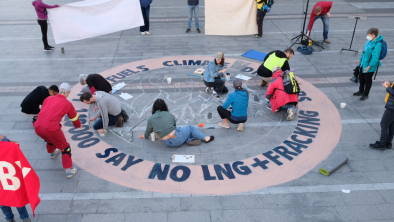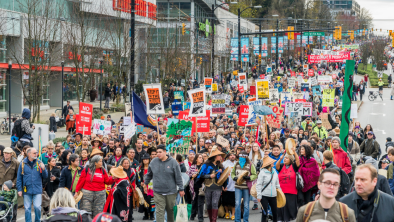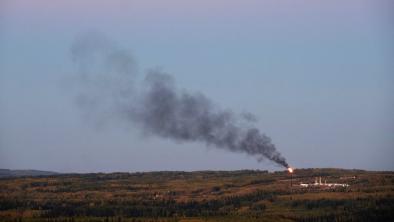Tapping Our Wild Rivers Can't Fix Climate Change
The Tyee
Veteran enviro says no to Tzeporah Berman's
'PowerUp' logic.
A week into the provincial election the person grabbing headlines is not a
politician but an environmentalist. Tzeporah Berman helped lead the
Clayoquot protests of '93 and then protect the Great Bear Rainforest but
lately she's been slamming the NDP for opposing the carbon tax while
throwing her weight behind a huge new energy strategy embraced by the
Liberals: run-of-river (RoR) power production.
And she's pulling a lot of others with her - while getting many others fired up
in disbelief and anger.
Berman and her influential allies want us to believe that only by harnessing
renewable "green" energy can we reduce global warming. And that the time
for debate is past; now we must just do it.
I'm one long-time environmentalist who couldn't disagree more.
As one of the founders of Greenpeace International, EcoJustice, Smart
Growth BC, the Dogwood Initiative, and other B.C. groups, I embrace real
solutions to our environmental challenges, including climate change, and the
movement to make them happen.
But in pressing for run-of-river, Berman and allies are only accelerating us
down a doomed path that will destroy precious natural ecologies in British
Columbia without making any significant dent in global warming, and
undermine the work of many environmentalists in the process.
There is a far better course of action, however, that would not divide
environmentalists but excite them and motivate the larger citizenry. Let me
explain.
Climate myopia
At first glance, run-of-river power seems pretty benign. Without recourse to
large dams, RoR diverts stream water into turbines, and then returns it to the
river downstream. In many rural areas, such projects have been in operation
as small-scale sources of power for generations.
But as proposed in B.C., RoR is on a far larger scale. And its numerous side
effects are now well known: Destructive construction in wild rivers and intact
habitats, new roads and penstocks carved through wilderness areas, long
transmission lines.
The list of concerns for RoR in B.C. goes on: the potential privatization of up
to 500 streams and rivers, the realization that the systems will work well only
during spring run-off, the gold rush mentality that has identified some
thousands of potential sites across the province, the industrial scale of most of
the projects, and the government/industry push that eschews careful planning
by removing local decision-making authority.
Recently Berman's new organization, PowerUp, held a well-attended meeting
in Vancouver to promote RoR on a massive scale in B.C. Berman gets lots of
support from power companies, political leaders and climate scientists,
including UVic's Andrew Weaver who, in a Vancouver Sun article, attacked
"so-called environmentalists" (like me, I guess) who don't agree with "what
science shows to be necessary." He dismisses as "outlandish" and "insidious"
our concerns for protecting wilderness rivers and aesthetic viewscapes. We
haven't done "the math"; proposed policies "are very well understood."
I would call this state of mind climate myopia -- where climate change is
essentially treated as the only environmental issue we face that, if we could
somehow solve it, would allow us to get back to business as usual. Old growth
forests, overfishing, fish farms, wild rivers? Back burner issues. We have to
focus on climate change or else it's all over.
All right then, let's focus on really solving climate change -- and why Berman
and her allies are dead wrong.
Don't raise supply, lower demand
As a "solution," an important distinction must be made here, for RoR is a
so-called supply-side solution, one to produce more energy. And even here,
B.C.'s green energy won't displace existing local sources of carbon-emitting
energy because the power is destined for export to California. Despite this, a
group of high profile environmentalists wrote in The Sun of the need for this
new power because "our electric cars are going to have to get juice from
somewhere." These advocates do acknowledge the need to promote solutions
on the demand side by conserving energy. They note approvingly that the
province plans to meet "more than half of BC's new electricity demand with
efficiency."
Supporters of "alternative energy" also argue that it will create new "green
jobs." But what jobs? Construction workers in remote camps blasting rightsof-
way through grizzly habitat to build RoR facilities on undeveloped rivers to
provide seasonal power for export to Los Angelites who can now crawl in
their electric cars guilt free along the freeway?
Environmentalists have long been fond of saying that the economy is a subset
of the ecology. But not Berman's brigade whose RoR strategies take the
economic growth trajectory (and its accompanying energy trajectory) as a
given. At best, Berman calls for "more sustainable development."
But wait. Is "more sustainable development" about new electric cars, new
power supplies, new energy exports, efficiency to meet new demand? Is there
not a problem here? In a country with some of the highest per capita energy
usage levels on the planet, where is the discussion of seriously reducing
energy demand overall and doing it for the long term?
Increasing efficiency and generating new "alternative" sources of supply will
never get us past the climate crunch because they confront a central
contradiction: continuous economic growth that will just swallow up whatever
gains are made, all the while upping the environmental impacts.
Can someone please explain how we can get past this contradiction except by
reducing total energy demand, and developing economic strategies that will
allow us to do so permanently?
Naming the problem
Taking the problem of economic growth seriously will not make you popular
with the mainstream. But doing so actually offers tangible lessons. Here are
three obvious ones:
1) We should not embark on destructive new supplies until demand
reductions have been exhausted -- to death.
2) We should not look at just simple efficiency gains in existing processes but
at whole new ways of designing our economy that inherently reduce energy
flows.
3) We should consider new sources of supply only later and only where each
renewable watt is directly tied to retiring an old carbon-based one.
So the climate emergency may not be about building more river utilities after
all. Maybe we would do better to work together to stop new infrastructure
investments like the new 10-lane Port Mann Bridge, a bridge for more cars,
and without light rail. And to do this as part of a full-on campaign to refashion
the whole face of urban transportation not just in the Lower Mainland but
worldwide.
But this doesn't fit with the one truth that all political leaders agree on: we
must keep the growth machine on stimulants.
A new model of development
These leaders have successfully exported this ideology to places like China,
the most populous place on earth. With China's commitment to a coal-fired
future of ever increasing production and consumption, exports and trade, a
car for every household, one must ask: What have we unleashed here? Is
there any vision of development that is both as universal and as inappropriate
to the survival of the planet as this?
Talking about how we might get past this ideology and its contradictions is a
taboo. But no one was talking about Wall Street's duplicity a year ago either.
It took a collapse for that.
For B.C., this contradiction has a very specific import: given China's growth
trajectory, what sense could it make to compromise one of the great river
regions on the planet for minimal practical effect? It IS one atmosphere after
all.
Climate scientists do not like to think about this. But when you do, you see
the second, and more difficult, "inconvenient truth" of climate change -- the
limits of a model of development that depends on always more growth, and
more energy to fuel it. That is to say, the PowerUp strategy.
Just as global warming was until recently marked by widespread denial, so too
denial of the problematic of growth economics is omnipresent today.
Confronting the tough truth of economic limits by actually trying to think and
work past the growth paradigm opens up great possibilities. Call it the strategy
of "growing into no-growth."
Instead of blasting in new supply projects to fuel electric cars, why not talk
about how to build "car-free" cities? Here we might start to save the earth,
and save money too. After all, if a car costs about $10,000 per year to own
and run, a "demand reduction" strategy could reduce not only energy needs,
but financial burdens on people. A strategy with a "double dividend," long
term.
Instead of seeking more profits from power exports to California, why not
work like crazy to reduce our food imports from that distant state with a
massive commitment to enhance local food production right here? The same
energy reduction benefits would result, and creating a true green economy
(literally).
Who's being 'realistic'?
The retort, of course, is that such ideas aren't politically realistic.
Not so, says one of the gurus of energy planning, Vaclav Smil of the
University of Manitoba. On the contrary, he argues that the history of creating
new energy supply systems has shown that the challenges are so enormous
that "none of the promises for greatly accelerated energy transitions will be
realized." Message: it's the renewable energy folks who aren't realistic.
Meanwhile, the distinguished American geographer David Harvey points out
in an April 2 interview in DemocracyNow! that the global economy was
worth $4 trillion in 1950 and is now at $56 trillion. With all hands on deck to
stimulate it way past even that, and to do so for as far into the future as
anyone can contemplate, we are hitting the "limits environmentally, socially,
politically…. In other words, we have to think about a zero-growth
economy." Message: it's the whole economistic agenda that's unrealistic.
In the competition of unrealities, I will throw my lot in with those who would
create new political possibilities. At least we would be working with the
feedback we are getting from nature, not continuing to work against it.
Environmental politics for this century
To ensure the success of avowedly green energy projects, governments in
British Columbia and Ontario now promise to pay big subsidies for more
power, and they have rewritten provincial legislation to prevent local
communities from deciding whether they want these development proposals.
In contrast, in the United States, the federal government is looking at new
forms of neighbourhood governance that might refashion all forms of resource
and energy use at the community level.
Actually empowering citizens to try out new things where they live entails a
form of what Harvard law professor Roberto Unger calls "democratic
experimentalism." DemocracyNow! calls it "deep democracy." Not here.
For citizens in this province, a choice presents itself. Does climate change
demand an impossible technological response to "power up" new sources of
energy to fuel an impossibly expanding political economy?
Or does it demand an active democratic response that can inspire a new
movement to "power down" into a calmer economy, and a livable future?
When you push past our collective denial, most people know the answer here.
But they don't know how to do it. As the climate clock ticks, this is the real
work to be done.
PowerUp? No thanks.
PowerDown? Sign me up!
Michael M'Gonigle is EcoResearch Professor of Environmental Law and
Politics at the University of Victoria.


